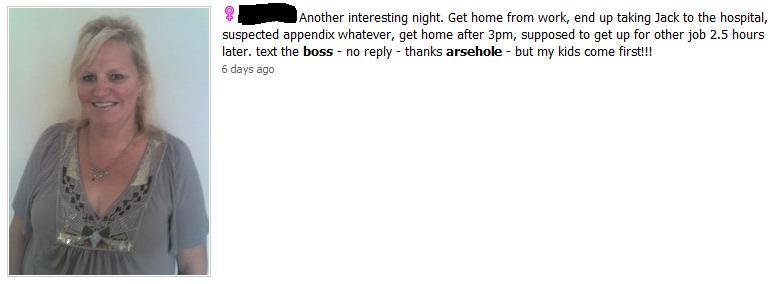Fast-Tracking Your P45 On Facebook
- PR
At one time or another most people, while casually chatting with their mates, have called their boss a berk. Or worse.
With social networks playing a key role in our lives, more and more people are having those conversations online now, and on Facebook it’s rife.
The trouble (for employees) is, thanks to last December’s changes in Facebook privacy settings many of the cat-calls are not being conducted privately, one-to-one, but one-to-many. In fact, one-to-everyone.
To see what people are saying about their bosses, go to https://youropenbook.org type “boss ar*e” (no quotes, no asterisk). It ranges from funny, sad to vitriolic. And it may just cost you your job.


Research from www.MyJobGroup.co.uk [client] today shows 40% of UK employees criticise their workplace on social networking and micro-blogging sites like Facebook and Twitter, with one in five admitting to lambasting their bosses.
Nearly 60% of the 1,000 UK workers polled confessed they would change what they wrote on their social networking profile if they knew their employer was reading it – yet those recent Facebook privacy settings changes mean many employers could already be checking up on staff.
The striking stat was that 55% of workers believe fellow staff should face disciplinary action for criticising their workplace on social networking sites.
Most staff had little or no awareness of the legal implications of their online jibes and 70 per cent had no idea if their company had an HR or disciplinary policy in place to tackle online criticism; only 16 per cent knew for certain their company was equipped to deal with such issues.
Lee Fayer, Managing Director of MyJobGroup.co.uk, which operates the UK’s largest network of regional job boards, said: “There is no doubt that social networks are seen as an environment where employees feel comfortable criticising their workplace and there is scant regard for how serious these taunts could be.
“Open Facebook accounts and Tweets are effectively online publishing channels and each has the potential to damage companies’ and individuals’ reputations, so staff should be careful of off-the-cuff criticism, no matter how funny it may seem at the time.
“As an employee, if you were to openly criticise or defame your workplace in a newspaper or within a printed flyer, you’d expect legal consequences – they should expect the same of online outbursts.
Fergal Dowling, an employment law specialist at Irwin Mitchell Solicitors, said: “Abuse of social media can be grounds for discipline, up to and including termination of contract, depending on the level of abuse, and the policies in place at the company.
“Employees need to be increasingly aware and careful about what they write online as proved by the conviction of a man who tweeted what he thought was a joke about an airport bomb.
“Employers and HR departments need to be upfront and honest with their employees about their policies. Many firms may ban social media altogether but in some industries that is simply not viable, and some creative industries rely on social media.
“The important thing is to make sure that everyone knows what the clear boundaries should any need for discipline occur.
“Businesses should consider adding new terms to their policies dealing with specific issues such as restrictions on disclosing company information, rules governing any mentions of the company and any concerns about work issues should be dealt with internally rather than blogging or posting about problems on Facebook.”